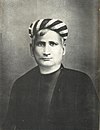Related Research Articles

Vande Mataram is a poem written in Sanskrit and Sanskritised Bengali by Bankim Chandra Chatterjee in the 1870s. The first two verses of the poem were adopted as the National Song of India in October 1937 by the Congress.

Bankim Chandra Chattopadhyay was an Indian novelist, poet, essayist and journalist. He was the author of the 1882 Bengali language novel Anandamath, which is one of the landmarks of modern Bengali and Indian literature. He was the composer of Vande Mataram, written in highly Sanskritised Bengali, personifying Bengal as a mother goddess and inspiring activists during the Indian Independence Movement. Chattopadhayay wrote fourteen novels and many serious, serio-comic, satirical, scientific and critical treatises in Bengali. He is known as Sahitya Samrat in Bengali.
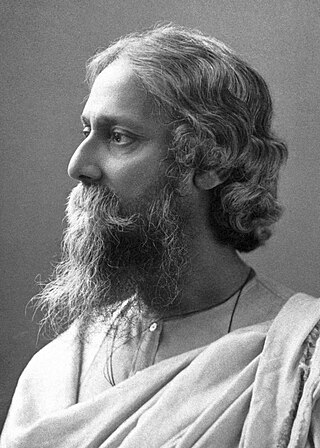
Bengali literature denotes the body of writings in the Bengali language and which covers Old Bengali, Middle- Bengali and Modern Bengali with the changes through the passage of time and dynastic patronization or non-patronization. Bengali has developed over the course of roughly 1,300 years. If the emergence of the Bengali literature supposes to date back to roughly 650 AD, the development of Bengali literature claims to be 1600 years old. The earliest extant work in Bengali literature is the Charyapada, a collection of Buddhist mystic songs in Old Bengali dating back to the 10th and 11th centuries. The timeline of Bengali literature is divided into three periods: ancient (650–1200), medieval (1200–1800) and modern. Medieval Bengali literature consists of various poetic genres, including Hindu religious scriptures, Islamic epics, Vaishnava texts, translations of Arabic, Persian and Sanskrit texts, and secular texts by Muslim poets. Novels were introduced in the mid-19th century. Nobel laureate Rabindranath Tagore is the best known figure of Bengali literature to the world. Kazi Nazrul Islam, notable for his activism and anti-British literature, was described as the Rebel Poet and is now recognised as the National poet of Bangladesh.
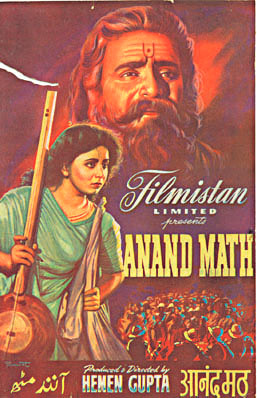
Anand Math is a 1952 Indian Hindi-language historical drama film directed by Hemen Gupta, based on the famous Bengali novel Anandamath, written by Bankim Chandra Chatterjee in 1882. The novel and film are set in the events of the Sannyasi Rebellion, which took place in the late 18th century in Bengal. In a BBC World Service poll conducted in 2003 across 165 countries, the Vande Mataram song written by Bankim Chandra Chatterjee, composed by Hemant Kumar, sung by Lata Mangeshkar was voted 2nd in the "World's Top Ten" songs of all-time.
Chatterjee, also known as Chattopadhyay is a Bengali Hindu surname, used by the Kulin group of the Bengali Brahmin caste. Together with Banerjees, Mukherjees, Bhattacharjees, and Gangulys, Chatterjees form the Kulin Brahmins, the highest tier of the Bengali caste system. They belong to Rarhi clan of Bengali Brahmins and the Kashyapa gotra.
The Sannyasi rebellion was a revolt by the sannyasis and sadhus in Bengal, India in the late 18th century which took place around Murshidabad and Baikunthapur forests of Jalpaiguri under the leadership of Pandit Bhabani Charan Pathak. While some refer to it as an early war for India's independence from foreign rule, since the right to collect tax had been given to the British East India Company after the Battle of Buxar in 1764, other historians categorize it as acts of violent banditry following the depopulation of the province in the Bengal famine of 1770.
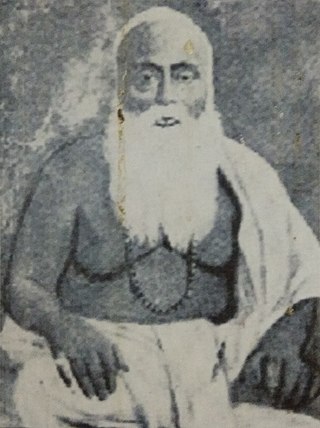
Akshay Chandra Sarkar –was a poet, an editor and a literary critic of Bengali literature.
Devi Chaudhurani is a Bengali novel written by Bankim Chandra Chatterjee and published in 1884. It was later translated to English by Subodh Chunder Mitter. Following closely after Anandamath, Bankim Chandra renewed call for a resurgent India that fights against oppression of the British Empire with strength from within the common people, based on traditional Indian values of austerity, dedication and selflessness. It is another important novel in the history of Bengali and Indian literature. Since it fuelled the patriotic struggle for Indian independence from the British Empire, the novel was banned by the British. The ban was lifted later by the government of India after independence. In this novel, Bankim Chandra reinforced his belief that armed face-to-face conflict with the Royal Army is the only way to win independence.

Bangadarshan was a Bengali literary magazine, founded by Bankim Chandra Chattopadhyay in 1872, and resuscitated in 1901 under the editorship of Rabindranath Tagore. The magazine had a defining influence on the emergence of a Bengali identity and the genesis of nationalism in Bengal.
Kapalkundala is a Bengali romance novel by Indian writer Bankim Chandra Chattopadhyay. Published in 1866, it is a story of a forest-dwelling girl named Kapalkundala, who fell in love with and married Nabakumar, a young gentleman from Saptagram, but eventually found that she is unable to adjust herself with the city life. Following the success of Chattopadhyay's first novel Durgeshnandini, he decided to write about a girl who is brought up in a remote forest by a Kapalika and never saw anyone but her foster-father. The story is set in Dariapur, Contai in modern-day Purba Medinipur district, Paschimbanga where Chattopadhyay served as a Deputy Magistrate and Deputy Collector.
Durgeshnandini is a Bengali historical romance novel written by Indian writer Bankim Chandra Chattopadhyay in 1865. Durgeshnandini is a story of the love triangle between Jagat Singh, a Mughal General, Tilottama, the daughter of a Bengali feudal lord and Ayesha, the daughter of a rebel Pathan leader against whom Jagat Singh was fighting. The story is set against the backdrop of Pathan-Mughal conflicts that took place in south-western region of modern-day Indian state of Paschimbanga during the reign of Akbar.
Bankim Puraskar is the highest award given by the Government of West Bengal for contribution to Bengali fiction. The award was instituted in 1975 in memory of Bankim Chandra Chattopadhyay, a famous Bengali novelist of the 19th century. It has been brought under the aegis of Paschimbanga Bangla Akademi, functioning under the Department of Information & Cultural Affairs, in 2003. The award is handed over by the Chief Minister of West Bengal.
B. Puttaswamayya was an Indian novelist, playwright and journalist who wrote in the Kannada language. He was awarded the prestigious Sahitya Academy Award in 1964 for his novel Kranthi Kalyana, and the Sangeet Natak Akademi Fellowship in 1978 for his plays by the Government of India.
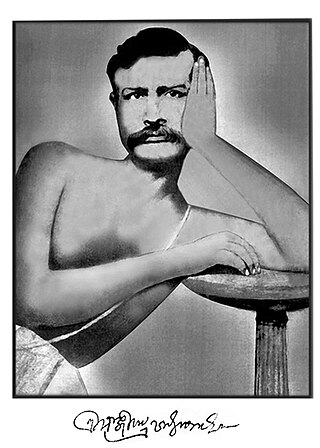
Sanjib Chandra Chattopadhyay was a Bengali writer, poet and journalist. He was the elder brother of Bankim Chandra Chattopadhyay.

Gar Mandaran is a village and a gram panchayat in the Goghat II CD block in the Arambag subdivision of the Hooghly district in the state of West Bengal, India.
Mrinalini is a Bengali novel written by Bankim Chandra Chatterjee. The novel was first published in 1869. This was Chatterjee's third novel, and he was 30 years old when the novel was first published.

Kapalkundala is a Bengali television soap opera based on the novel of the same name written by Bankim Chandra Chatterjee. It premiered on 2 December 2019 and will air on Bengali GEC Star Jalsha, 9:30 pm every day. It is produced by Raj Chakraborty and stars Soumi Chatterjee, Debojyoti Roychowdhury, Saunak Ray, Tumpa Paul & Sayak Chakraborty
Dariapur is a village in the Deshapran CD block in the Contai subdivision of the Purba Medinipur district in the state of West Bengal, India.

1770: Ek Sangram is an upcoming Indian Telugu-language historical drama film, based on the Bengali novel Anandamath, written by Bankim Chandra Chattopadhyay in 1882. The novel and film are set in the events of the Sannyasi Rebellion, which took place in the late 18th century in Bengal. 1770: Ek Sangram is produced by SSI Entertainment and PK Entertainment.
Kapalkundala is a 1981 Bengali drama film directed and produced by Pinaki Bhushan Mukherji. It starred Ranjit Mallick, Bhanu Bannerjee and Mahua Roy Chowdhury in lead roles. This was the fourth remake of Kapalakundala based on 1866 same name novel of Bankimchandra Chattopadhyay.
References
- ↑ "Remembering Bankim Chandra Chattopadhyay, the man who gave us Vande Mataram". India Today. Retrieved 20 January 2019.
- ↑ Devaleena Das; Colette Morrow (16 January 2018). Unveiling Desire: Fallen Women in Literature, Culture, and Films of the East. Rutgers University Press. pp. 343–. ISBN 978-0-8135-8786-8.
- ↑ Rabindranath Tagore (24 September 2003). Grain Of Sand. Penguin Books Limited. pp. 11–. ISBN 978-81-8475-840-5.
